Financial and Operating Review
Five-year summary
The five-year summary shows our continually strong financial position. In the five years from 2017, the business has delivered strong operating surpluses through the landlord business. Changes in turnover between years primarily reflects market sales activity that had been in our pipeline. We expect to see smoother growth in turnover as we deliver on our current development pipeline, that provides a consistent number of new rented homes and also those offering low-cost shared ownership options.
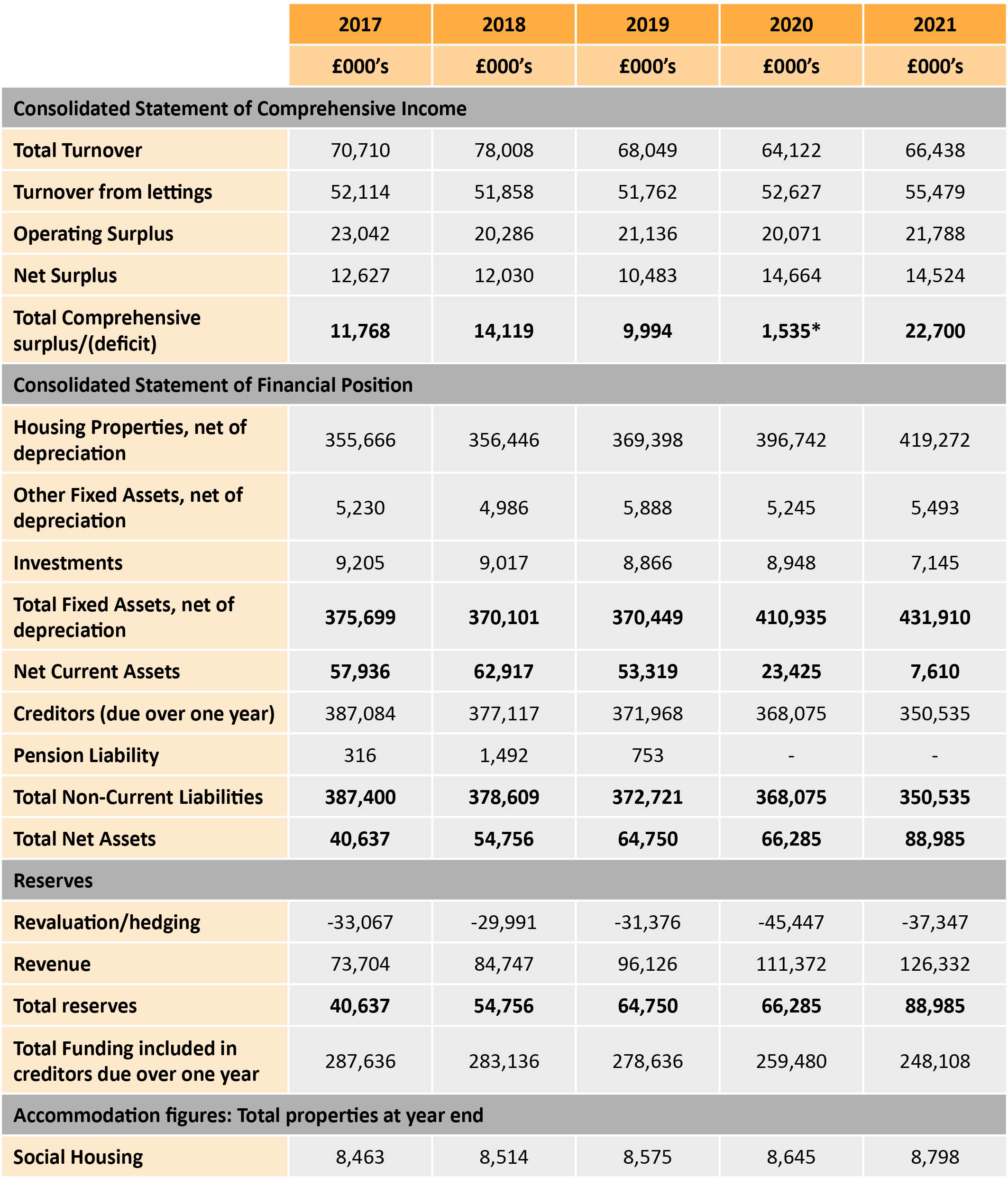
* £14m movement for financial instruments
Over the last five years, operating surpluses have been consistently over £20m with our operating margin reaching 32.8% in 2021. This represents a consistently strong operating performance against a consistent backdrop of economic and political uncertainty. Fundamental to this has been the delivery of our core social housing lettings activities, which have maintained a strong performance, even though more than 90% of our properties have genuinely low-cost, social rents.
The increase in our asset base and subsequent reduction in gearing has been primarily funded through significant increases in our revenue reserves. This has been driven through a combination of a cash-generative core business, development activity and some sale of low-performing assets.
Long-term liabilities are detailed in the financial statements and reflect government grants, pension liabilities and the market value of financial instruments. The pension liability position of £0m relates to our Local Government Pension Scheme which has been closed to new members since 2003. While we are not in a deficit position, the inability to recoup any residual surplus once the scheme is finished means we cannot legally recognise the positive year-end position.
The sections below provide a deeper analysis of the key financial elements of settle’s business:
Turnover and surplus

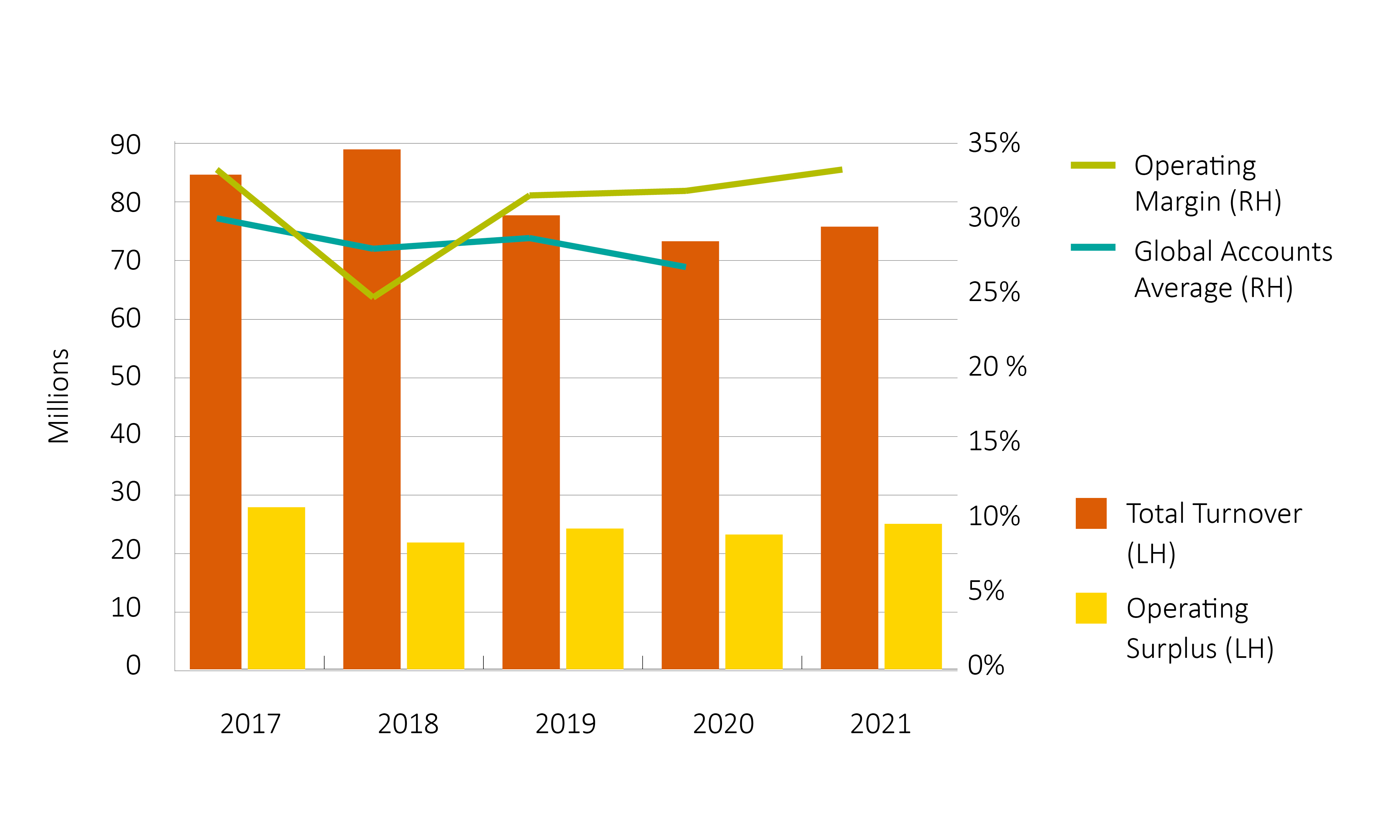
Since 2018/19, operating margins have grown steadily as the business has seen an increase in new properties, excellent income collection performance and robust controls on cost. This has also seen performance remain consistently above the sector average.
Turnover has remained strong with variances between years largely driven by the timings of sales completions and varying levels of market sale.
Turnover breakdown
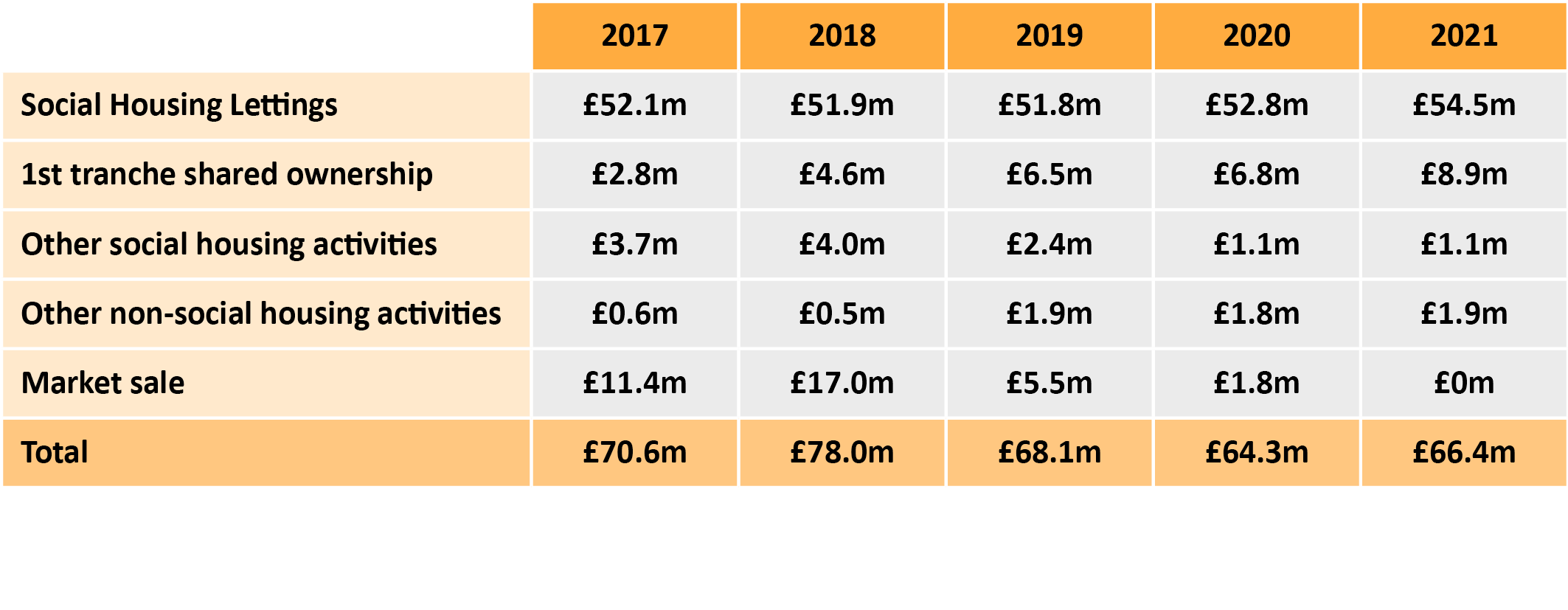
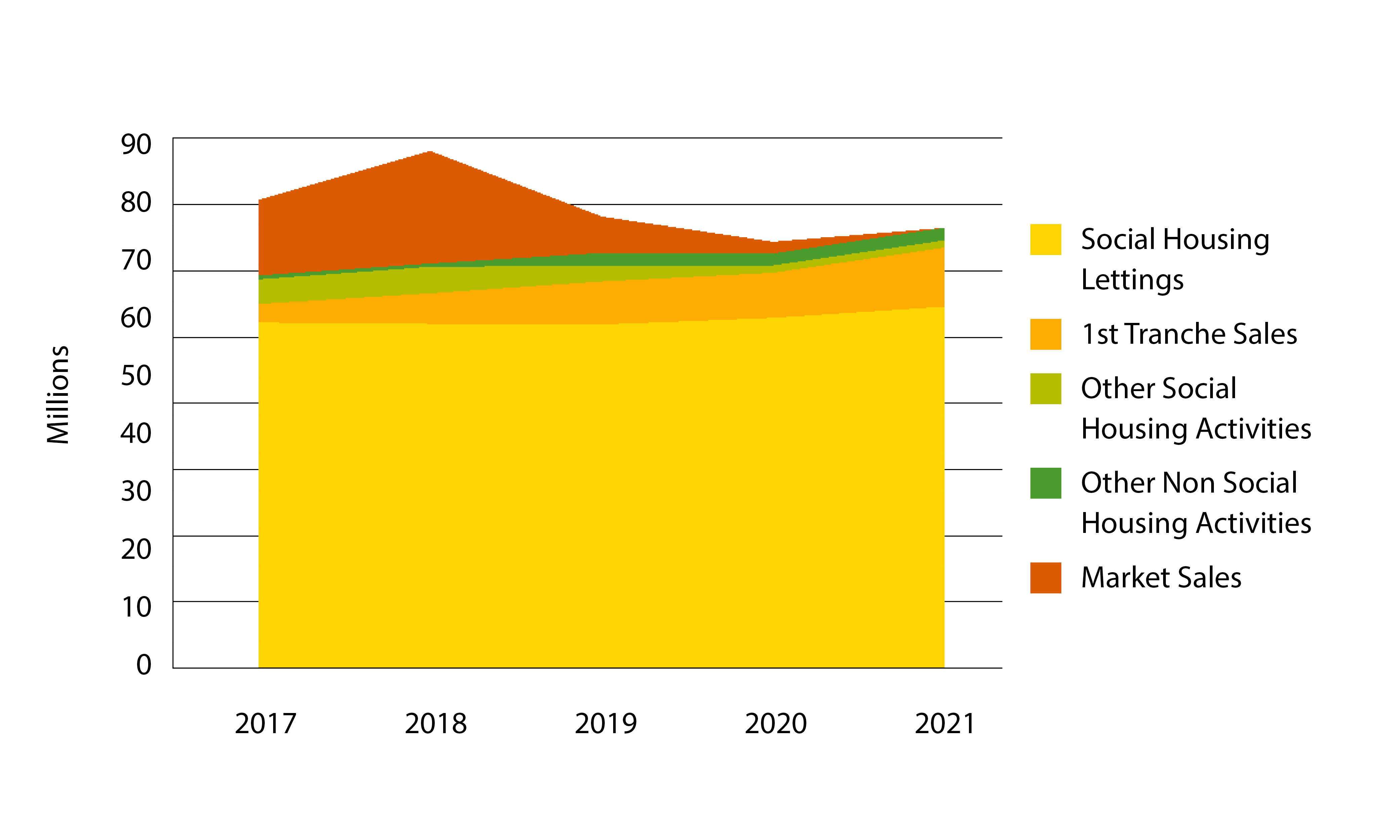
82% of our turnover in 2021 relates to social housing lettings, reflecting the continued commitment we have to the provision of truly affordable rented properties.
Our conscious decision to move to a development strategy that focuses on affordable housing rather than market sale can be clearly seen from looking over the past five-year performance. We have focussed our attention on delivering much-needed affordable housing which provides reliable income streams.
Assets and debt

A reduction in long-term debt, coupled with an increasing asset base, has led to a reduction in gearing throughout the period. This provides settle with opportunities to increase borrowing and expand our future development programme in line with our target of building 1,500 homes by 2024.
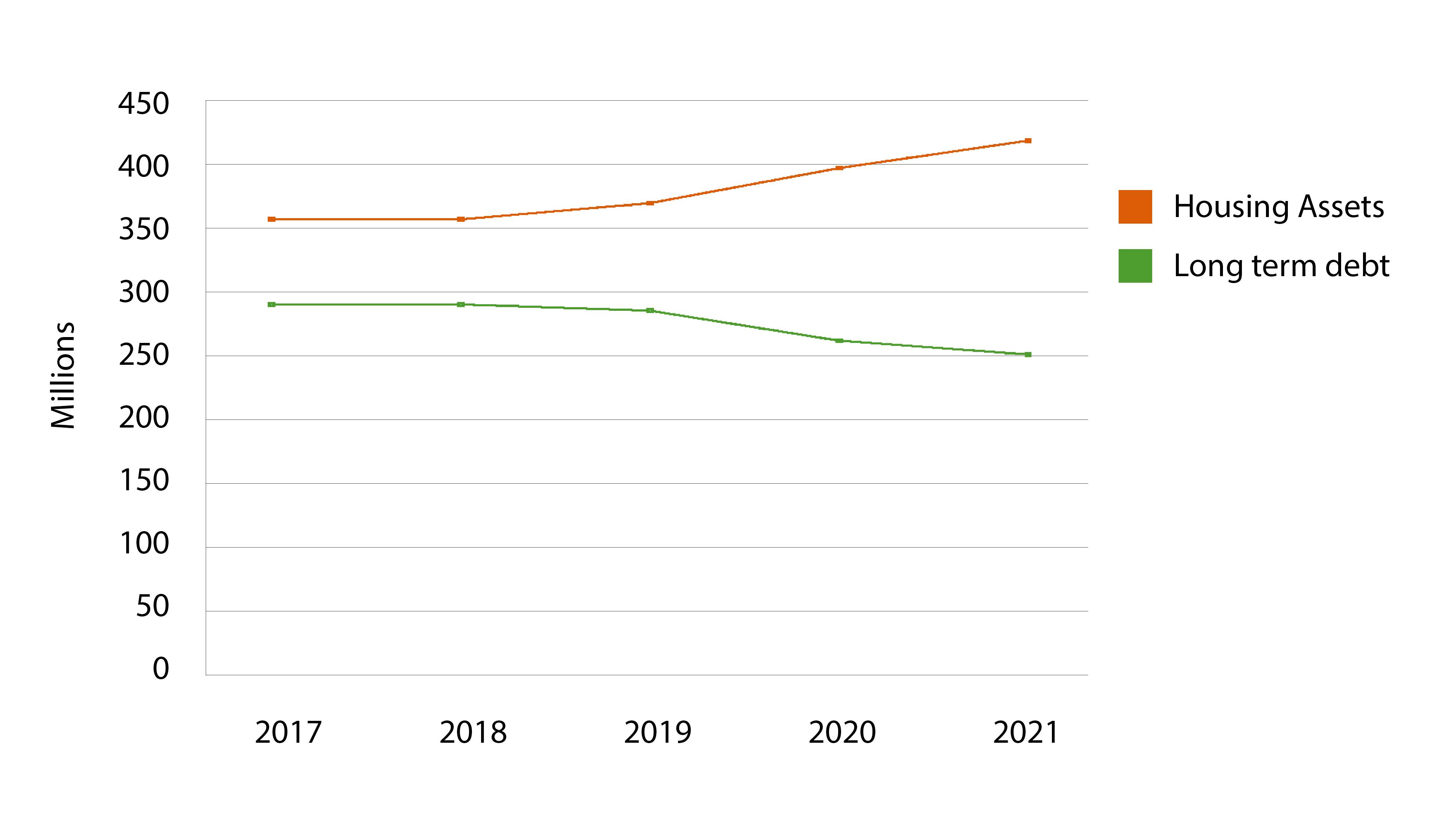
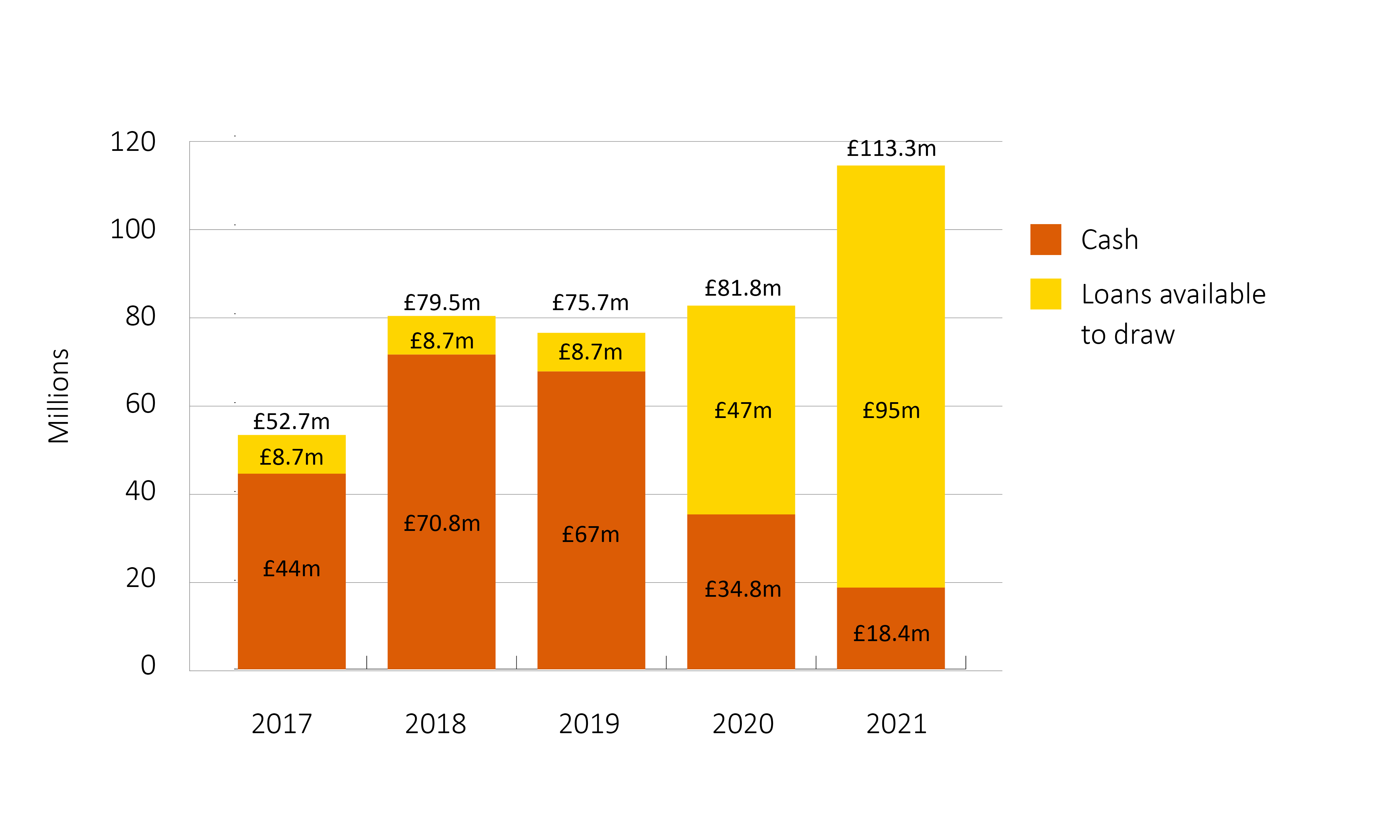
Liquidity
settle’s treasury strategy includes strict targets to ensure that sufficient liquidity is in place to fund at least 18 months of future commitments.
As at 31st March 2021, our liquidity headroom was £113.3m. We have consciously increased the amount of funds we have access to as we have increased our development ambitions. This liquidity position is sufficient to ensure our committed developments are fully funded.
Drawn debt breakdown
settle currently has £252.8m of drawn debt, split between bank loans and bonds. The long-term nature of our debt portfolio ensures there is limited refinancing risk in the short to medium term.
83.6% of our portfolio is currently fixed by either stand-alone derivatives or fixed rate bonds. This represents a comfortable mixture of interest rate management and flexibility within the debt to take advantage of potential fundraising opportunities.
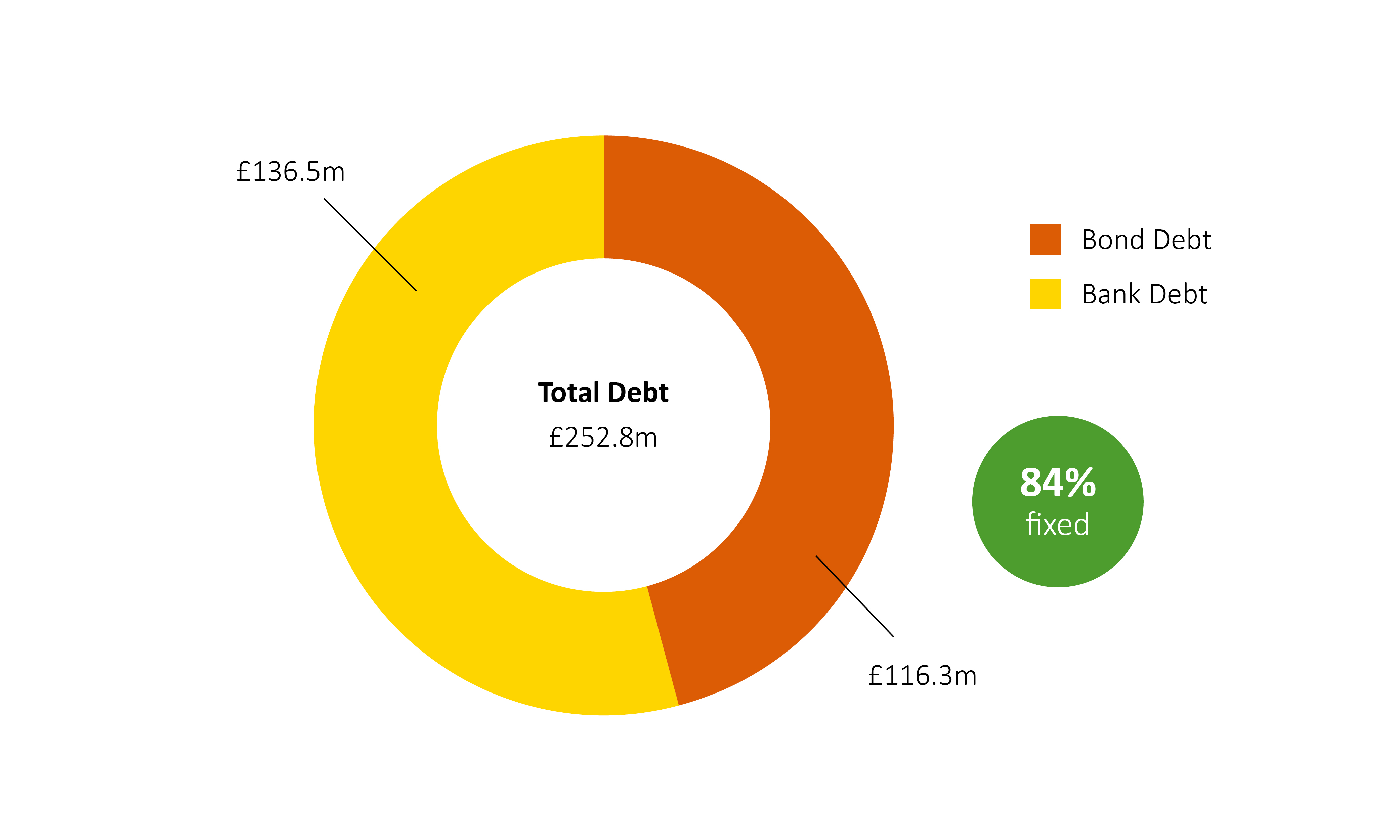
Operating Review
Investment in existing assets
As our financial review demonstrated, settle is a business that is fundamentally focussed on affordable housing. Provision of genuinely affordable rented homes remains the core component of the business and represents 91% of our stock and 97% of Group turnover.
As our corporate strategy sets out, delivering good services is of huge importance to us and this means that we continue to invest in our existing stock. Despite the impact of the pandemic, which significantly curtailed our ability to complete work to properties, during the year we invested £3.8m (2020: £7.5m) in capital improvements to existing homes.
Our long-term financial plan is aligned to the results of our stock condition surveys and an additional £16m is built into the plan to ensure that all of our homes meet EPC Band C as a minimum by the 2030 deadline. We are accelerating the number of EPC surveys that we have so that by the end of 2021/22, at least 66% of our stock has an up-to-date EPC rating. Stock Condition surveys are being carried out over a five-year cycle so that we continue to have a robust understanding of the performance of our asset base, together with clarity on where future investment will need to be made in our stock. This allows us to forward-plan our asset management work, which in turn can drive procurement efficiencies.
“An additional £16m is built into the plan to ensure that all of our homes meet EPC Band C as a minimum by the 2030 deadline”

Service delivery
One of our key priorities over the last 12 months has been to support customers in managing their rent payments during the pandemic and the continued rollout of Universal Credit across North Hertfordshire. We increased resources in our housing team so we could maintain our proactive approach of engaging with those customers in need of support. This has proved to be a successful approach with a year-end arrears figure of 2.56%.
During 2020/21 void turnaround time has increased from 29 days to 41.6 days. This has been driven by an increase in the number of voids we are servicing and delays in being able to let some of our extra care units within North Hertfordshire. We have already commenced a voids review including all colleagues involved in the voids process in order to improve this performance.
Throughout the past year, we have continued to provide emergency repairs, all of which have been completed within 24 hours. We have provided routine repairs whenever it has been safe to do so and in line with government guidance around the pandemic. As lockdown restrictions have eased at various points during the past year, we have seen additional demand for some routine repairs and have brought in additional capacity where possible working alongside our in-house teams to provide these as quickly as possible. As a result, our position at the end of the year shows that the average time to complete a repair was 18 days, improving by eight days on last year, with 99% of these repairs being completed within target.
Throughout 2020/21, we generated £1.9m of social value (HACT methodology) representing the real focus of ensuring we are adding value over and above our basic landlord requirements.
Development and sales
During the year, we completed on 172 homes. All of these homes were affordable (104 affordable rent, 8 social rent and 60 shared ownership). Throughout the year we have found that demand for our shared ownership properties has remained high. Average void sales times of 18 days (2019/20 17 days) and a first tranche sales average of 45% (2019/20 44%) reflect that our product is well-regarded and continues to meet the gap in the market where demand exceeds supply. This demand for shared ownership has helped to cross-subsidise the development of affordable, low-cost rented properties.
Work has progressed during the year to build our future development pipeline in order to meet our ambition of at least 1,500 homes by 2024. As at the end of March 2021, we already have 955 homes committed to be built in future years, demonstrating the acceleration we are making and the reputation we are developing with key stakeholders in our localities.
A place where colleagues love to work
We have been particularly proud of the way in which colleagues have supported our customers – and each other – throughout the pandemic. We have made great strides in progressing our people strategy that seeks to ensure that settle is seen as a place where colleagues love to work. In particular we:
- placed specific focus on our wellbeing offering. For example, the ‘togetherwecare’ launch focussed our support and offering to colleagues, including mindfulness sessions, health and wellbeing week, virtual time out breaks, IT equipment for children working at home etc.
- rolled out the settle way behaviour framework to strengthen how we demonstrate our values and improve the way we behave with residents to improve outcomes.
- improved our colleague trust score – our measure of satisfaction among our staff – by 6% to 82%. In addition, 93% of colleagues say settle is a great place to work. Having highly engaged colleagues striving to perform better will improve the delivery of our customer experience. We have seen this in the way colleagues have been dedicated to supporting residents during the past year, examples being the significant reduction we have seen in absence levels and colleagues volunteering to make additional calls to customers who are isolated or lonely, as well as delivering items such as food parcels or medication.
- reviewed and defined our approach to recruitment, onboarding and wellbeing, including toolkits for settle leaders. In addition, we have created our ‘value everyone’ group to celebrate the differences our colleagues bring and to work with this group on our future Equality, Diversity & Inclusion strategy. All of which defines our playbook for the colleague experience at settle.
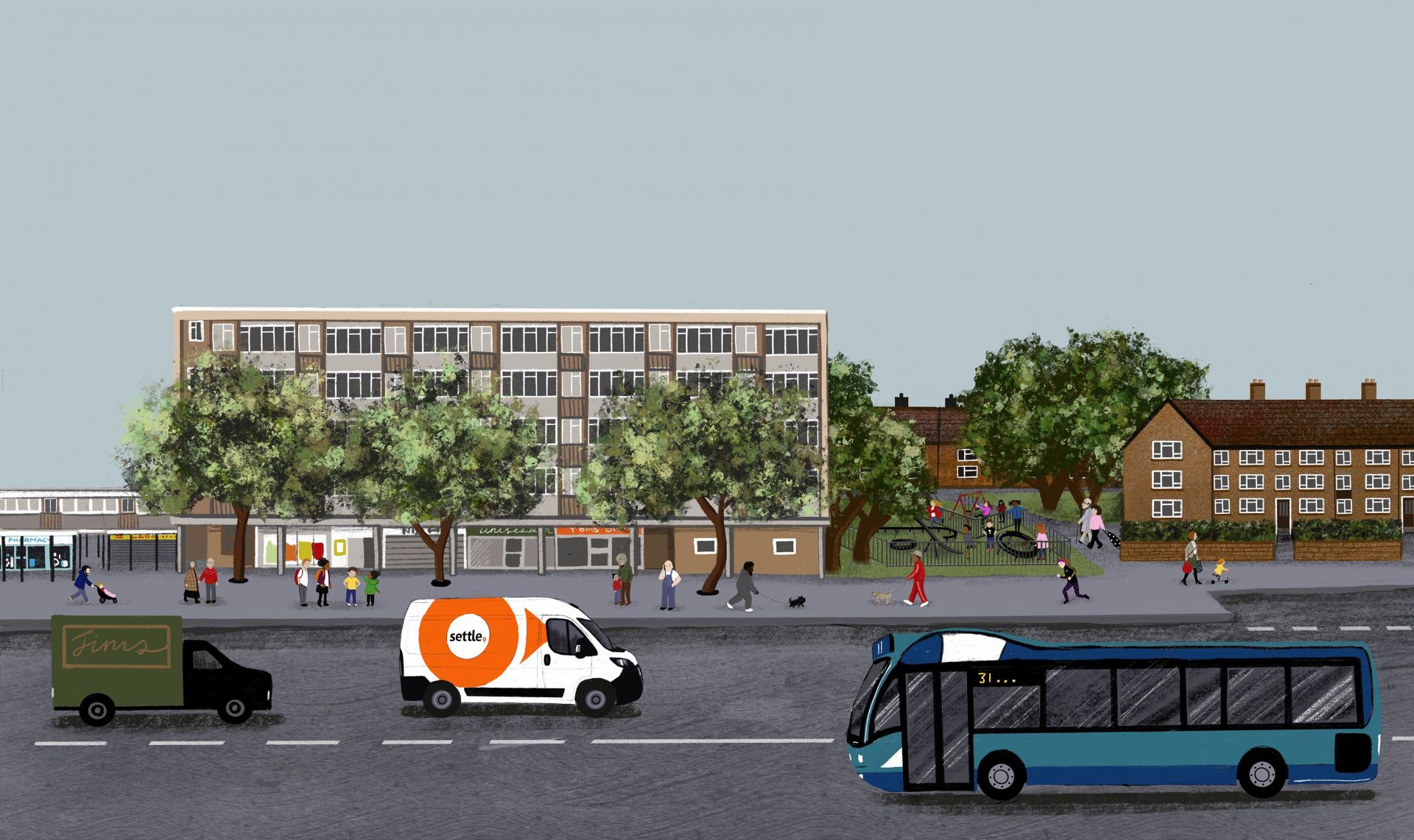
An environmentally sustainable business
As a social purpose organisation, we know it is important that we operate in an environmentally sustainable manner. We’re committed to working in a sustainable way across all that we do at settle, making sure this delivers real benefits for our residents and communities.
Our Board agreed our first sustainability strategy in January 2021 that focussed on the following key areas to meet our strategic ambition:
- tackling fuel poverty among our residents;
- investing in our existing homes and neighbourhoods with a specific focus on community-based approaches to sustainability;
- creating sustainable new homes;
- supporting the local economy and developing sustainable supply chains;
- ensuring that our sustainability credentials acts as an attractor for existing and future colleagues.
2020/21 has been very much a year of data collection to underpin our future work programmes. We have conducted our first carbon baselining exercise which identified that more than 90% of our emissions came from our existing homes. This information supports our asset investment plans; taking a fabric-first approach to ensuring that homes are thermally efficient.
We also undertook our first SHIFT (Sustainable Homes Index For Tomorrow) accreditation and were delighted to be awarded Silver. The analysis also identified where we could continue to progress and this has helped support our 2021/22 delivery plans.
More information on our approach to environmental sustainability is provided in the Environmental, Social and Governance ESG section of this report.
Social Purpose
Social purpose is at the heart of settle. During 2019/20, colleagues delivered more than 100 ‘giving back days’, volunteering their time across a range of activities, from renovating a school playground and helping at food banks, to supporting reading in schools and libraries.
Our 2019-2024 strategy reinforces our commitment to our social purpose, with a target of 3,000 giving back days delivered by 2024.
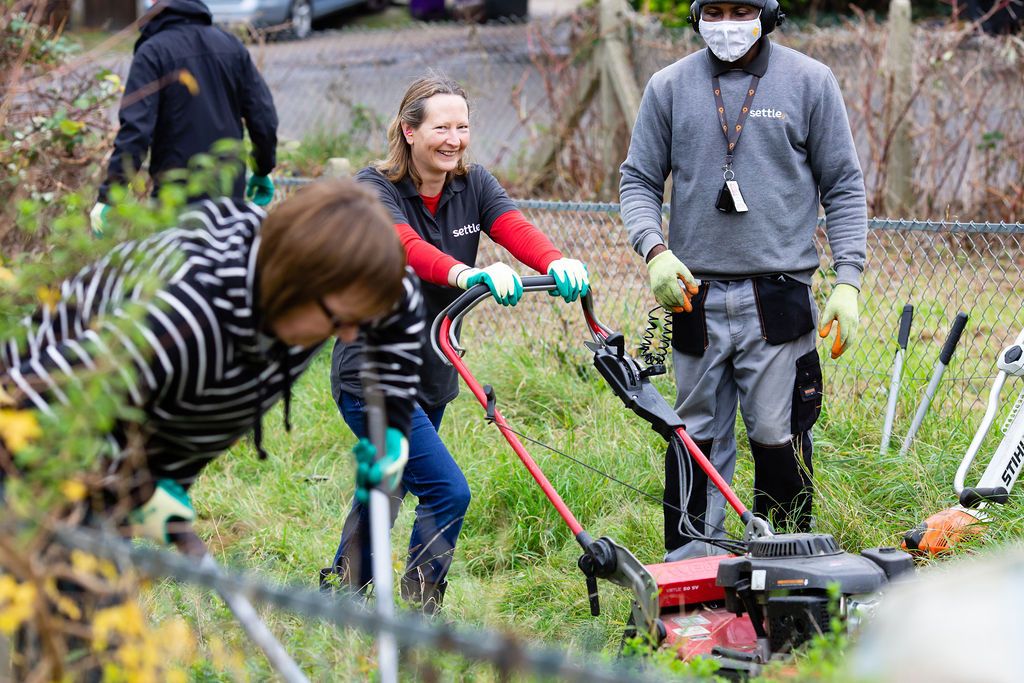
Equality, Diversity and Inclusion
Through every part of our work at settle supporting our colleagues, residents and communities, we are committed to ensuring that all individuals have an equal opportunity to make the most of their lives. We believe that no-one should have poorer life chances because of where they were born, who they are, what their beliefs are or whether they have a disability. Our culture at settle is inclusive and embraces and celebrates the differences in everyone.
We fully support the importance of greater transparency and disclosure on ethnicity pay as part of a business’s environmental, social and governance (ESG) reporting. As part of this we will report on ethnicity pay in the same way that organisations are required to report on gender pay, using the same calculation methodology set out by the Government Equalities Office.
The calculations of our mean ethnicity pay gap show that minoritised ethnic colleagues on average earn 0.04 per cent higher than non-minoritised ethnic colleagues. The median ethnicity pay gap shows 0% difference in the middle earning colleagues at settle. These insignificant differences suggest that there is currently no ethnicity pay gap at settle.
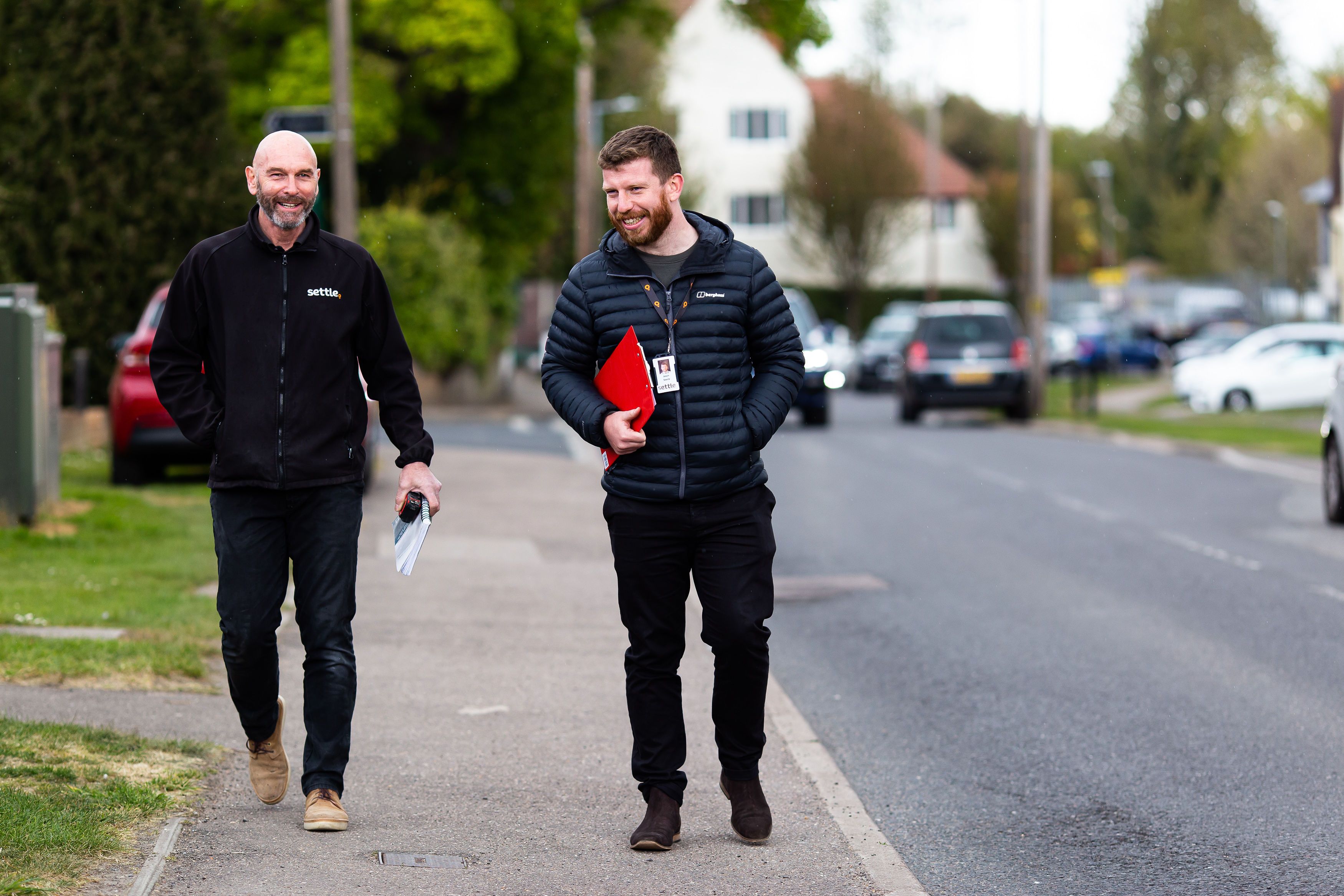
We are clear that the promotion and awareness of equality and diversity issues at all levels of an organisation can bring many benefits such as higher performance, greater innovation, and a more positive environment for all. We also know that reviewing our diversity offer for residents will ensure we are providing the right level of support, improve access to services, establish communities and meet the needs of our residents.
As next steps we will build on the work of our ‘value everyone’ group, which looks at celebrating diversity among our colleagues, to complete further analysis with our data in regard to equality of opportunities at settle on all protected characteristics, to understand our current position and make sure that we are doing everything possible for colleagues and customers on these important issues. This will make sure that we:
- make fact-based decisions that will shape our equality, diversity and inclusion strategy, which we are currently working towards;
- provide an environment where we feel included and can make choices;
- provide services and homes that are accessible and respond to the needs of individuals;
- address and challenge any discrimination experienced either by individuals or by groups of individuals;
- create an environment where everyone’s contribution is respected and valued, and where our colleagues can develop and grow; and
- educate, raise awareness, and promote the benefits of working with diverse communities.
